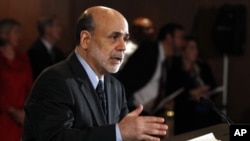U.S. Federal Reserve Chairman Ben Bernanke says the economy could fall back into recession if congressional Republicans and President Obama cannot reach an agreement to raise Washington's legal limit on borrowing. The head of the U.S. central bank says without a deal, the country could lurch back into recession.
U.S. Federal Reserve Chairman Ben Bernanke told a key congressional committee that failing to raise the debt ceiling would have serious consequences.
"I think the worst outcome if we don't raise the debt limit is that at some point we default on the debt and as I've said before, that would create a huge financial calamity, and that in turn would affect everybody and it would set job creation back significantly," said Bernanke.
Bernanke was addressing the the Financial Services Committee in the House of Representatives, where some Republicans indicated they thought he was overstating the impact of a default.
But Bernanke said there is no choice in this case.
"The right analogy for raising the debt limit is having a spending spree with your credit card and then refusing to pay your bill," he said. "That is what refusing to raise the debt limit is."
Bernanke has been urging congress and the president to reduce the U.S. debt for some time, but he objects to proposals to immediately slash spending sharply. He argues such cuts could hurt economic growth, which could result in lower tax receipts, and have the unintended consequence of making the debt worse.
Bernanke says it took Washington years to run up these debts, and paying them off will have to be done over time with care.
Bernanke heads the U.S. central bank, and was reporting on the state of the U.S. economy. He said U.S. economic growth will pick up in the second half of the year as high prices ease for energy and fuel.
He said growth will probably rise to an annual rate of around 2.8 percent, which is faster than the first few months of this year, but slower than the last quarter of 2010.
Bernanke indicated that the Fed is prepared to take additional steps to stimulate the economy if the current lull in growth continues.
Fed experts say the U.S. unemployment rate will fall from its current 9.2 percent, but not as quickly as previous predictions.
Related video by Mil Arcega:
















